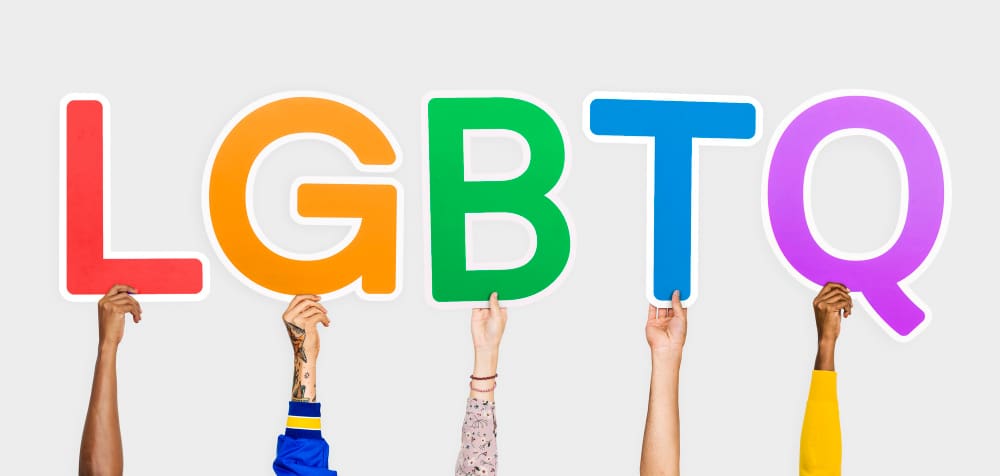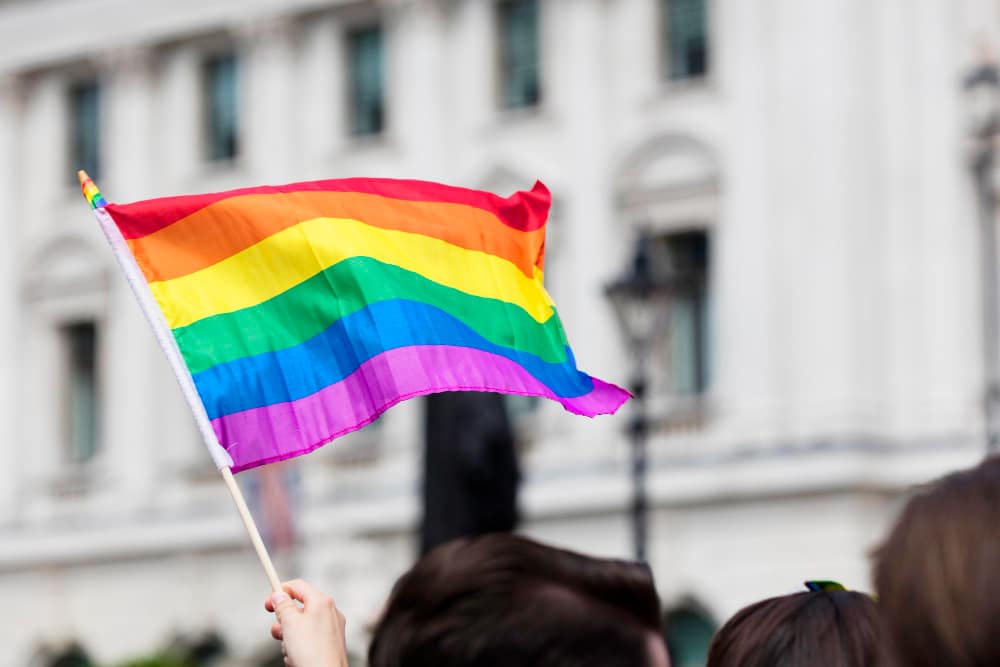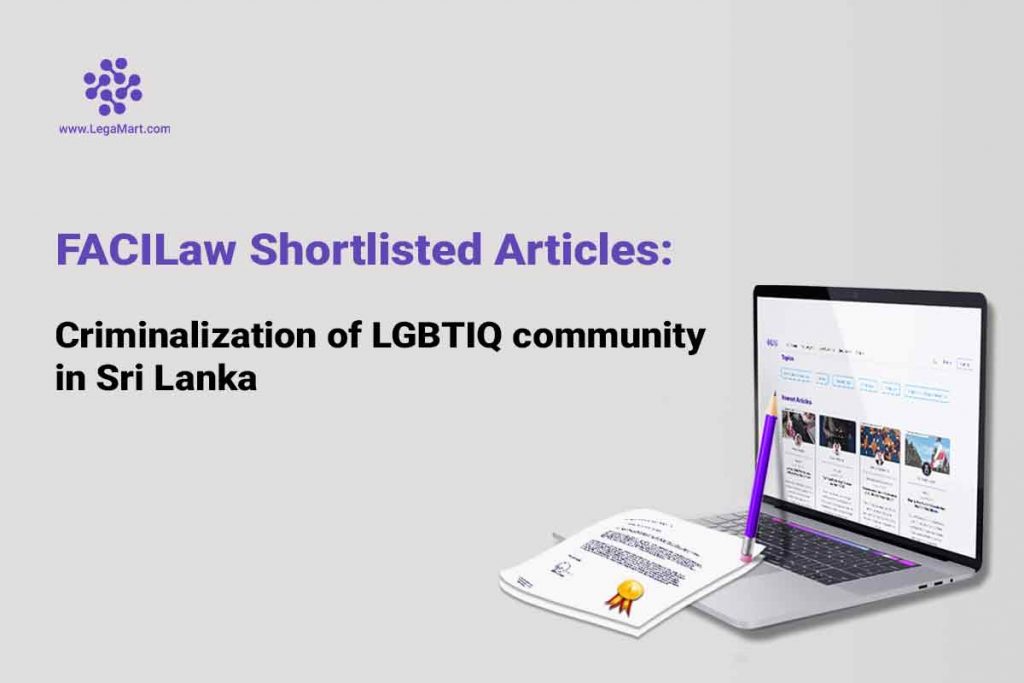This article is written by: Kaushalya Sendanayaka Arachchi
Criminal laws of Sri Lanka are mostly based on its colonial-era laws that were passed during the British rule reflective of Victorian values. Some of these laws criminalize same-sex relations between adults. This also results in wide practices of ‘conversion therapy’ on such sexual minorities, which remains legally unchallenged. Personal realities of individuals such as Sexual Orientation and Gender Identity/Expression (SOGIE) that challenge social or cultural norms result in their exclusion and are considered as ‘gender outlaws.’
The Lesbian, Gay, Bisexual, Transgender, Intersex and Queer (LGBTIQ) community in Sri Lanka may be targeted for violence and discriminated against for this very reason.
However, in a recent legal trend, Sri Lanka proposed amendments to its anti-LGBTIQ laws in an attempt to protect the community. A bill to amend the Penal Code sections that criminalizes same-sex acts was introduced by a ruling party member as a Private Member’s bill. The bill, yet to be tabled at the parliament’s order paper, was welcomed by the members of the LGBTIQ community in a rather skeptical stance given the country’s long standing backward notion towards the community.
This article explores the barriers set forth by laws affecting sexual minorities in light of the recent proposed legal reform, examining the law and homosexuality in Sri Lanka in the backdrop of British Colonialism. The article addresses issues of discrimination on the grounds of SOGIE drawing analogies from landmark cases of different jurisdictions.
Certain anti-LGBTIQ laws may prove to be discriminatory and applied disproportionately. Amnesty International points out that morality and public health are common justifications relied upon by States to justify criminalization of sex among two consenting adults of the same sex. Such laws based on morality are furthered for reasons of religion, nationalism or tradition and are often unchallengeable. As EQUAL GROUND (EG) states in their report, these laws have been utilized to persecute individuals on grounds of their real or perceived SOGI.

Section 365 of the Penal Code of Sri Lanka 1883 prohibits acts of “carnal intercourse against the order of nature” while Section 365A prohibits “any act of gross indecency with another person.” The former offence contains ten years of imprisonment with a fine while the latter, a period of two years and/or a fine. The term “gross indecency” contained in Section 365A has not been defined and is left to interpretation by police officers, prosecutors and judges and as EG in their report points out, this allows ambiguity and thus invites abuse.
In the case of Galabada Payagalage Sanath Wimalasiri v Officer-in-Charge (Police Station Maradana) (2016), the Supreme Court of Sri Lanka held that criminalization of homosexuality is very much part of the law of Sri Lanka. The case calls for the repeal of such offences, however, does not necessarily outline the areas of reform or make specific recommendations. In contrast, Sri Lanka’s neighbor India decriminalized homosexuality in 2018. Chief Justice Dipak Misra delivering his verdict in the Supreme Court Case of Navtej Singh Johar & Others v Union of India [2018] held that the law was “irrational, indefensible and manifestly arbitrary.”
In Wimalasiri, the accused-appellant was charged before the Magistrate’s Court under Section 365A. These offences are based on the misconception that sodomy laws and homosexuality are the same things and as Aluwihare J, explains sodomy and buggery offences were part of English law and is based on public morality. However, the offence is no longer part of English law following the repeal of the offence by enacting the Sexual Offences Act of 1967 which was influenced by the Wolfenden Report recommendation that the law should only govern indecent behaviour that offends the public and not intervene in private affairs in an attempt to legalise morality.
Human Rights Watch (HRW) reported that transgender and gay men in Sri Lanka claim that they were also arrested under the Vagrants’ Ordinance. This Ordinance which dates to 1841 addresses illegality of prostitution, solicitation and vagrants that engage in public loitering. The Ordinance also prohibits acts of “gross indecency” or being “incorrigible rogues” procuring “illicit or unnatural intercourse.”
As Stychin argues, these laws are made to portray heterosexual acts and identities as normal and requires them to view homosexuality as ‘unnatural’ and ‘deviant.’ Some analysis indicates a distinct interpretation of the word ‘unnatural’ to mean it “violates nature” to use “men as if they were women, or women as if they were men,” which reflects discomfort or opposition to same-sex sexuality underpinned by biblical teachings.
Farrell explains that same-sex sexual conduct is often critiqued for its “unnaturalness” given that such unions cannot result in procreation. However, many who identify as heterosexual are unable to procreate for various reasons such as infertility or age. This is evidenced in the police abuse cases against transgender persons and other sexual minorities.
Out of the LGBTIQ community the transgender sector is the most marginalized group. This is because those who transgress gender barriers or challenge predominant concepts of gender roles are likely to be targeted for violence. Although no laws specifically criminalize transgender persons in Sri Lanka, Section 399 of the Penal Code criminalizes gender impersonation and has been used by the police frequently to target transgender persons as a basis for arrest.
This is under the assumption that a ‘transgender person taking measures to assume gender identity that is different from the sex assigned at birth has the malicious intent of cheating others.’
For instance, a trans-individual reported to be arrested by the police several times ‘for pretending to be a woman’ was subsequently found murdered in Dambulla, Sri Lanka in 2017. A transgender sex worker in Colombo claimed that she felt that police targeted them where she was arrested once under the Vagrants’ Ordinance and once for cheating by impersonation, and each time she was not engaged in sex work.
Instances of criminalization of LGBTIQ community in Sri Lanka

Police abuse on LGBTIQ community in Sri Lanka
The HRW in their Report found that most LGBTIQ persons were arrested based on their SOGI and were typically detained without proper cause or evidence and were rarely detained for extended periods of time. A majority of their interviewees claimed that they had suffered sexual, physical or sever verbal abuse at the hands of the Sri Lankan Police, and nearly all of those reported were transgender.
Male to Female transgender sex workers sometimes referred to as nachchi experience police abuses both inside and outside their sex work, ‘suggesting transgender identity as a primary source of stigma’ as their feminine gender identity/transgender identity makes them prone to police abuse. In this interview-based study, respondents claimed that after being identified as transgender by the police, they were subject to physical abuse for that reason.
Further, the research found that some nachchi were denied the same quality of police service or any service at all due to their identity. Police mistreatment towards nachchi who ‘embrace a feminine gender identity,’ is an indication of humiliation towards these individuals deviating the cultural standards of masculinity.
Deviance
This crime is a behavior that violates formal laws prohibiting such acts while deviance is any behavior that violates social norms and such acts includes inter alia alcoholism, substance dependency or cross dressing. Woods explains that the criminalization of homosexuals allowed to view LGBTIQ people in the criminal justice system as deviant sexual offenders, noting further the failure of the criminal laws to identify that psychological and social hardships faced by LGBTIQ people shape their offending and victimization beyond sodomy laws.
Ken Plummer explaining “homosexual” identity, argues that all forms of deviancy should be viewed within a historical and cultural context. Discussing deviant outcomes among transgender persons a study examines the general strain theory and explores aspects such as risky sexual behaviors, substance use, suicidality and the degree to which discrimination – as a source of strain, plays a role in transgender lives.
General strain theory explains that individuals experience strain in their lives such as the failure to achieve goals, removal of positively valued stimuli, and presence of negative experiences. Such individuals, they argue, may engage in deviant behavior as a result.
The study reveals that overall, some types of deviant behaviors are higher among transgender individuals than the general population given the high rates of stigma and discrimination faced by them. Moreover, emotional responses seem to not fully explain the relationship between strain and deviance but in fact strain may directly promote deviance. Thus, discrimination based on non-normative gender identity, they explain may result in deviant behaviors.
Discrimination
The Indian case of Naz Foundation v NCT OF Delhi (2009) held that freedom from discrimination (direct or indirect) is a civil and political right. Davis asserts that transgender persons whose gender identity are not socially affirmed are the most vulnerable towards discrimination in particular situations, including denial of employment and benefits or dismissal due to their identity or denial of gender appropriate services.
In Sri Lanka, stable employment is challenging for trans-individuals given the lack of proper legal documentation reflecting their gender identity. They also face discrimination in accessing healthcare where majority of medical professionals and staff consider them as mentally ill and/or unwilling to treat them. Moreover, Sex Reassignment Surgery (SRS) is inaccessible to many transgender persons with their economic status.
Flynn criticizes the failure to remedy discrimination faced by sexual minorities and those who are gender nonconforming identifying a ‘gap in sex and sexual orientation equality jurisprudence’ when it comes to trans-litigation cases. This failure arises from a judicial assumption that the law focuses on discrimination based on sex i.e., whether a person is anatomically male or female, instead of their gender shaped by social constructs of masculinity and femininity.
This is evidenced in USA federal courts where they differ in their decisions on employment discrimination based upon gender characteristics or upon biological sex despite the Price Waterhouse v Hopkins judgment prohibiting employment decisions based upon sex-stereotyping.
The jurisprudence of the European Court of Human Rights (EctHR) is rather progressive as evidenced in the case of P v S and Cornwall, where a trans-woman challenged her dismissal of employment following her decision to undergo a sex reassignment surgery. The ECtHR decided that such discrimination is within the purview of discrimination on the grounds of sex under European Union law.
The Court recognized the need to protect transgender rights while prohibiting discrimination on the basis of gender reassignment. This was reaffirmed in Richards v Secretary of State for Work and Pension where the Court held that non-discrimination on the basis of sex is a fundamental human right that ought to be ensured by courts. In this case a post-operative trans-woman argued that UK’s policy in refusing to grant her a retirement pension at the age of 60, on the ground that she was (still) a man amounted to discrimination.
Tryfonidou argues that the above two cases also illustrate that the prohibition against discrimination goes further and protects transsexuals against subtle instances of discrimination given the failure of the law to address such particular situations. Alston and Goodman notes that although extensively unexplained, in the case of Toonen v. Australia the Human Rights Committee held that discrimination on the basis of sexual orientation was regulated by the right to equality under the International Covenant on Civil Political Rights (ICCPR.)
Similarly, National Legal Services Authority v. Union of India (2014) held that discrimination on the grounds of ‘sexual orientation or gender identity’ violates Article 14, the Equality provision of the Indian Constitution.
Despite the criticisms leveled at the inadequacy of the equality provision of the Constitution of Sri Lanka, the Government in its reply to the Human Rights Committee with regard to measures adopted to protect LGBTIQ persons from discrimination, took the stance that their rights are constitutionally protected by Article 12. A tweet by former President Gotabaya Rajapaksa was seen to have addressed the right to non-discrimination while acknowledging one’s right to live life with dignity regardless of their SOGIE.
However, in a recent landmark case decided by the UN Committee on the Elimination of Discrimination against Women (CEDAW); Rosanna Flamer-Caldera vs. Sri Lanka (2022) it was decided that inter alia that the activist’s right to non-discrimination had been violated by the criminalization of same-sex sexual intimacy in Sri Lanka and the Committee called for decriminalization.
In this context, simply amending criminal laws would not necessarily safeguard the rights of LGBTIQ individuals given that these laws have been associated with ‘sodomy laws’ and allows law enforcement to abuse their powers and arrest, detain or harass persons of the LGBTIQ community. Hence, as seen above repealing said laws is the way forward which would remove any ambiguity and devoid using the threat of these laws.




